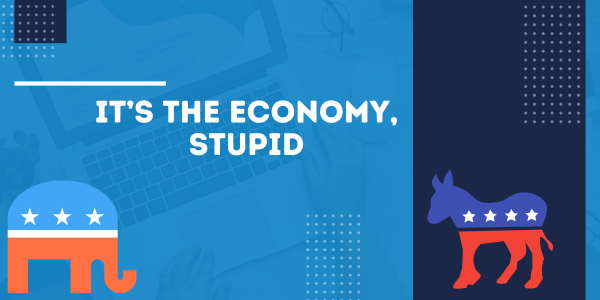As the 2024 presidential election approaches, the American political landscape is again dominated by a phrase that has withstood the tests of time and relevance: “It’s the economy, stupid.” This adage, coined initially during Bill Clinton’s 1992 presidential campaign, underscores economic issues’ pivotal role in shaping electoral outcomes. It is particularly apt in today’s context, as candidates from both sides of the political spectrum grapple with economic challenges that have profound implications for voters’ lives. In this blog post, we’ll delve into the origins of this iconic phrase, explore its significance in the upcoming election, and examine why it remains so crucial in American politics today.
Origins of the Phrase “It’s the economy, Stupid”
The phrase “It’s the economy, stupid” originates from a simple yet effective internal strategy memo written by James Carville, a strategist for Bill Clinton during the 1992 presidential campaign. Clinton’s team needed to keep focus when facing an incumbent president, George H.W. Bush, who had foreign policy triumphs but presided over a faltering economy. Carville devised three points for campaign staff to remember, emphasizing that the team should focus on economic issues over others – and one of those points was succinctly captured as “The economy, stupid.”
Though originally meant for internal campaign use, the phrase quickly gained prominence. It encapsulated that a candidate’s ability to address voters’ economic concerns could make or break an election—a notion that still applies today. The 1992 election saw Clinton defeat Bush, with economic concerns playing a central role in voters’ decisions, cementing the phrase’s significance in political discourse.
Relevance in the 2024 Presidential Election
Fast-forward to 2024, and “It’s the economy, stupid” remains as pertinent as ever in American politics. Much like in 1992, today’s economic landscape poses unique challenges and opportunities for presidential candidates. Inflation, stagnant wages, job markets adjusting to post-pandemic realities, and national debt concerns are among the nation’s pressing economic issues.
As of 2023, the U.S. economy has experienced significant shifts, with rapid technological advancements, changes in trade dynamics, and evolving workforce demands reshaping traditional economic models. For voters, these changes manifest as tangible issues: the cost of living, job security, and the promise of economic opportunity. Candidates in 2024 are thus compelled to offer credible solutions to these concerns, recognizing that the economy is not just about statistics and stock markets but about the day-to-day lives of ordinary Americans.
What Does “It’s the Economy, Stupid” Imply Today?
The enduring power of the phrase lies in its simplicity and truth: for many voters, economic issues are paramount. When voters step into the voting booth, decisions about their financial future often weigh heavily. This demands candidates to present clear, actionable, and inclusive economic policies. In the digital age, where information is abundant, and attention spans shorter, distilling complex financial issues into coherent, relatable messages is even more critical.
For the 2024 candidates, understanding and addressing the economic concerns of various demographics – from millennials burdened with student debt to retirees worried about the sustainability of Social Security – will be crucial. The economy is not monolithic; it encompasses diverse issues that affect different populations in myriad ways. Candidates must tailor their messages and solutions to resonate with these distinct groups while maintaining a coherent overall economic strategy.
Implications for Voter Engagement
The prevailing economic climate also impacts voter engagement and enthusiasm. Historically, economic hardship can increase voter turnout as individuals seek change and solutions. Conversely, economic stability might result in complacency or satisfaction with the status quo. In 2024, significant economic challenges—or the perception thereof—could drive higher voter engagement, accompanied by intense scrutiny of candidates’ economic credentials.
Moreover, the economy often intersects with other critical issues such as healthcare, education, and national security. Candidates must articulate how their economic policies will influence these areas, providing a comprehensive leadership vision. Voters are increasingly savvy, understanding that economic policies do not exist in a vacuum but impact nearly all facets of society.
Conclusion
The adage “It’s the economy, stupid” remains a crucial reminder of the centrality of economic issues in presidential elections. As the 2024 election looms, candidates must address the American electorate’s complex and varied economic concerns with clarity and pragmatism. While policies, personalities, and political strategies will undoubtedly play significant roles, convincing voters of a candidate’s economic competence could determine the outcome.
As we navigate the uncertain waters of the modern economy, this phrase serves as both a challenge and a guide to candidates to prioritize effective economic policies and a guide to voters to critically evaluate who can best manage the economy for the benefit of all. As we march toward election day, the timeless relevance of “It’s the economy, stupid” continues to echo through the halls of American political discourse, a testament to the enduring power of a strong economy to shape a nation’s future.

